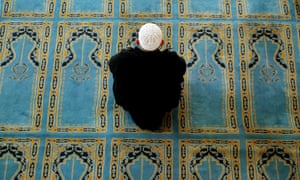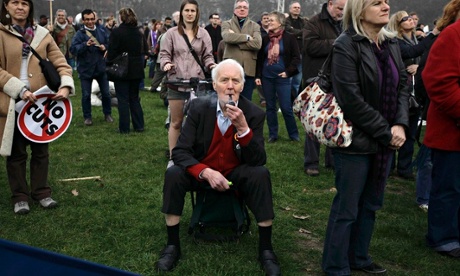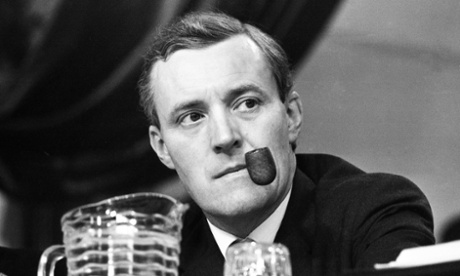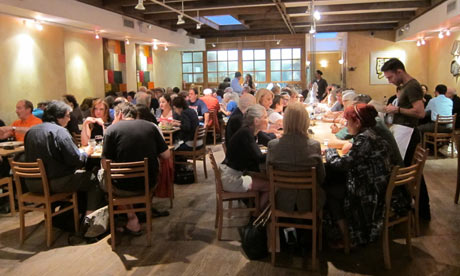Ijeoma Olua in The Guardian

I don’t believe in a higher power, but the fact we’ve never proven there isn’t one means there could be a God.
There are many different ways in which people come to atheism. Many come to it in their early adult years, after a childhood in the church. Some are raised in atheism by atheist parents. Some come to atheism after years of religious study. I came to atheism the way that many Christians come to Christianity – through faith.
I was six years old, sitting in my frilly yellow Easter dress, throwing black jelly beans out into the yard, when my mom explained the story of Easter to me. She explained Jesus’s crucifixion and resurrection as the son of God, going into great detail. And when she was finished telling me the story that had been a foundation of her faith for the majority of her life, I looked at her and said: “I don’t think that really happened.”
I didn’t come to this conclusion because the story of a man waking from the dead made no sense – I wasn’t an overly analytical child. I still enthusiastically believed in Santa Claus and the Easter bunny. But when I searched myself for any sense of belief in a higher power, it just wasn’t there. I wanted it to be there – how comforting to have a God. But it wasn’t there, and it isn’t to this day.
The same confidence that many of my friends have in the belief that Jesus walks with them is the confidence that I have that nobody walks with me. The cold truth that when I die I will cease to exist in anything but the memory of those I leave behind, that those I love who leave are lost forever, is always with me.
These are my truths. I don’t like these truths. As a mother, I’d give anything to believe that if anything were to happen to my children they would live forever in the kingdom of a loving God. But I don’t believe that.
But my conviction that there is no God is nonetheless a leap of faith. Just as we have been unable to prove there is a God, we have also been unable to prove that there isn’t one. The feeling that I have in my being that there is no God is what I go by, but I’m not deluded into thinking that feeling is in any way more factual than the deep conviction by theists that God exists.
I keep this fact in mind – that my atheism is a leap of faith – because otherwise it’s easy to get cocky. It’s easy to look at acts of terror committed in the names of different gods, debates about the role of women in various churches, unfamiliar and elaborate religious rules and rituals and think, look at these foolish religious folk. It’s easy to view religion as the root of society’s ills.
But atheism as a faith is quickly catching up in its embrace of divisive and oppressive attitudes. We have websites dedicated to insulting Islam and Christianity. We have famous atheist thought-leaders spouting misogyny and calling for the profiling of Muslims. As a black atheist, I encounter just as much racism amongst other atheists as anywhere else. We have hundreds of thousands of atheists blindly following atheist leaders like Richard Dawkins, hurling insults and even threats at those who dare question them.
Look through new atheist websites and twitter feeds. You’ll see the same hatred and bigotry that theists have been spouting against other theists for millennia. But when confronted about this bigotry, we say “But I feel this way about all religion,” as if that somehow makes it better. But our belief that we are right while everyone else is wrong; our belief that our atheism is more moral; our belief that others are lost: none of it is original.
Perhaps this is not religion, but human nature. Perhaps when left to our own devices, we jockey for power by creating an “other” and rallying against it. Perhaps we’re all part of a system that creates hierarchies based on class, gender, race and ethnicity because it’s the easiest way for the few to overpower the many. Perhaps we all fall in line because we look for any social system – be it Christianity, Islam, socialism, atheism – to make sense of it all and to feel like we matter in a world that shows time and time again that we don’t.
If we truly want to free ourselves from the racist, sexist, classist, homophobic tendencies of society, we need to go beyond religion. Yes, religion does need to be examined and debated regularly and fervently. But we also need to examine our school systems, our medical systems, our economic systems, our environmental policies.
Faith is not the enemy, and words in a book are not responsible for the atrocities we commit as human beings. We need to constantly examine and expose our nature as pack animals who are constantly trying to define the other in order to feel safe through all of the systems we build in society. Only then will we be as free from dogma as we atheists claim to be.
There are many different ways in which people come to atheism. Many come to it in their early adult years, after a childhood in the church. Some are raised in atheism by atheist parents. Some come to atheism after years of religious study. I came to atheism the way that many Christians come to Christianity – through faith.
I was six years old, sitting in my frilly yellow Easter dress, throwing black jelly beans out into the yard, when my mom explained the story of Easter to me. She explained Jesus’s crucifixion and resurrection as the son of God, going into great detail. And when she was finished telling me the story that had been a foundation of her faith for the majority of her life, I looked at her and said: “I don’t think that really happened.”
I didn’t come to this conclusion because the story of a man waking from the dead made no sense – I wasn’t an overly analytical child. I still enthusiastically believed in Santa Claus and the Easter bunny. But when I searched myself for any sense of belief in a higher power, it just wasn’t there. I wanted it to be there – how comforting to have a God. But it wasn’t there, and it isn’t to this day.
The same confidence that many of my friends have in the belief that Jesus walks with them is the confidence that I have that nobody walks with me. The cold truth that when I die I will cease to exist in anything but the memory of those I leave behind, that those I love who leave are lost forever, is always with me.
These are my truths. I don’t like these truths. As a mother, I’d give anything to believe that if anything were to happen to my children they would live forever in the kingdom of a loving God. But I don’t believe that.
But my conviction that there is no God is nonetheless a leap of faith. Just as we have been unable to prove there is a God, we have also been unable to prove that there isn’t one. The feeling that I have in my being that there is no God is what I go by, but I’m not deluded into thinking that feeling is in any way more factual than the deep conviction by theists that God exists.
I keep this fact in mind – that my atheism is a leap of faith – because otherwise it’s easy to get cocky. It’s easy to look at acts of terror committed in the names of different gods, debates about the role of women in various churches, unfamiliar and elaborate religious rules and rituals and think, look at these foolish religious folk. It’s easy to view religion as the root of society’s ills.
But atheism as a faith is quickly catching up in its embrace of divisive and oppressive attitudes. We have websites dedicated to insulting Islam and Christianity. We have famous atheist thought-leaders spouting misogyny and calling for the profiling of Muslims. As a black atheist, I encounter just as much racism amongst other atheists as anywhere else. We have hundreds of thousands of atheists blindly following atheist leaders like Richard Dawkins, hurling insults and even threats at those who dare question them.
Look through new atheist websites and twitter feeds. You’ll see the same hatred and bigotry that theists have been spouting against other theists for millennia. But when confronted about this bigotry, we say “But I feel this way about all religion,” as if that somehow makes it better. But our belief that we are right while everyone else is wrong; our belief that our atheism is more moral; our belief that others are lost: none of it is original.
Perhaps this is not religion, but human nature. Perhaps when left to our own devices, we jockey for power by creating an “other” and rallying against it. Perhaps we’re all part of a system that creates hierarchies based on class, gender, race and ethnicity because it’s the easiest way for the few to overpower the many. Perhaps we all fall in line because we look for any social system – be it Christianity, Islam, socialism, atheism – to make sense of it all and to feel like we matter in a world that shows time and time again that we don’t.
If we truly want to free ourselves from the racist, sexist, classist, homophobic tendencies of society, we need to go beyond religion. Yes, religion does need to be examined and debated regularly and fervently. But we also need to examine our school systems, our medical systems, our economic systems, our environmental policies.
Faith is not the enemy, and words in a book are not responsible for the atrocities we commit as human beings. We need to constantly examine and expose our nature as pack animals who are constantly trying to define the other in order to feel safe through all of the systems we build in society. Only then will we be as free from dogma as we atheists claim to be.




